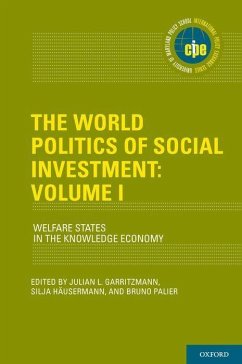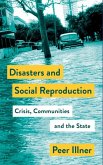The World Politics of Social Investment: Volume I
Welfare States in the Knowledge Economy
Herausgeber: Garritzmann, Julian L; Palier, Bruno; Häusermann, Silja
The World Politics of Social Investment: Volume I
Welfare States in the Knowledge Economy
Herausgeber: Garritzmann, Julian L; Palier, Bruno; Häusermann, Silja
- Gebundenes Buch
- Merkliste
- Auf die Merkliste
- Bewerten Bewerten
- Teilen
- Produkt teilen
- Produkterinnerung
- Produkterinnerung
The World Politics of Social Investment: Welfare States in the 21st Century is the first of two volumes of the World Politics of Social Investment (WOPSI) project, which systematically maps and explains different welfare reform strategies in democratic countries around the world.
Andere Kunden interessierten sich auch für
![Disasters and Social Reproduction: Crisis Response Between the State and Community Disasters and Social Reproduction: Crisis Response Between the State and Community]() Peer IllnerDisasters and Social Reproduction: Crisis Response Between the State and Community36,99 €
Peer IllnerDisasters and Social Reproduction: Crisis Response Between the State and Community36,99 €![The Vortex The Vortex]() Scott CarneyThe Vortex31,99 €
Scott CarneyThe Vortex31,99 €![The Social Roots of Risk The Social Roots of Risk]() Kathleen TierneyThe Social Roots of Risk47,99 €
Kathleen TierneyThe Social Roots of Risk47,99 €![The Unthinkable The Unthinkable]() Amanda RipleyThe Unthinkable18,99 €
Amanda RipleyThe Unthinkable18,99 €![The Battle for Paradise The Battle for Paradise]() Naomi KleinThe Battle for Paradise20,99 €
Naomi KleinThe Battle for Paradise20,99 €![The Devil Never Sleeps The Devil Never Sleeps]() Juliette KayyemThe Devil Never Sleeps26,99 €
Juliette KayyemThe Devil Never Sleeps26,99 €![The Wake-Up Call The Wake-Up Call]() John MicklethwaitThe Wake-Up Call11,99 €
John MicklethwaitThe Wake-Up Call11,99 €-
-
-
The World Politics of Social Investment: Welfare States in the 21st Century is the first of two volumes of the World Politics of Social Investment (WOPSI) project, which systematically maps and explains different welfare reform strategies in democratic countries around the world.
Hinweis: Dieser Artikel kann nur an eine deutsche Lieferadresse ausgeliefert werden.
Hinweis: Dieser Artikel kann nur an eine deutsche Lieferadresse ausgeliefert werden.
Produktdetails
- Produktdetails
- International Policy Exchange
- Verlag: Oxford University Press Inc
- Seitenzahl: 552
- Erscheinungstermin: 10. Mai 2022
- Englisch
- Abmessung: 240mm x 158mm x 33mm
- Gewicht: 888g
- ISBN-13: 9780197585245
- ISBN-10: 0197585248
- Artikelnr.: 64052774
- Herstellerkennzeichnung
- Libri GmbH
- Europaallee 1
- 36244 Bad Hersfeld
- gpsr@libri.de
- International Policy Exchange
- Verlag: Oxford University Press Inc
- Seitenzahl: 552
- Erscheinungstermin: 10. Mai 2022
- Englisch
- Abmessung: 240mm x 158mm x 33mm
- Gewicht: 888g
- ISBN-13: 9780197585245
- ISBN-10: 0197585248
- Artikelnr.: 64052774
- Herstellerkennzeichnung
- Libri GmbH
- Europaallee 1
- 36244 Bad Hersfeld
- gpsr@libri.de
Julian L. Garritzmann is Professor of Political Science at the Goethe University Frankfurt. As a comparative political scientist, his research lies at the intersection of comparative political economy, political sociology, and comparative political institutions. He specializes in welfare state research, education and social investment policy, global social policy, party politics, and public opinion. Julian Garritzmann holds a PhD from the University of Konstanz, Germany. Before joining Frankfurt, he was Senior Researcher at the University of Zurich, Switzerland, and Max Weber Fellow at the European University Institute, Florence, Italy, and held Visiting Fellow positions at Harvard, Duke, and Rutgers. His publications include The Political Economy of Higher Education Finance (awarded the German Political Science Association's Dissertation Prize), and A Loud, but Noisy Signal? Public Opinion, Parties, and Interest Groups in the Politics of Education Reform in Western Europe (Cambridge University Press) as well as several articles in journals such as the European Journal of Political Research, European Sociological Review, Journal of European Social Policy, Journal of European Public Policy, Journal of Legislative Studies and West European Politics. Homepage: https://sites.google.com/site/juliangarritzmann/ Silja Häusermann At the University of Zurich, she is the co-director of the University Research Priority Programme "Equality of Opportunities". She is the author of The Politics of Welfare State Reform in Continental Europe: Modernization in Hard Times (CUP, 2010), and a co-author of The Age of Dualization: The Changing Face of Inequality in Deindustrializing Countries (OUP, 2012), The Politics of Advanced Capitalism (CUP, 2015) and Contention in Times of Crisis: Recession and Political Protest in Thirty European Countries (CUP, 2020). Homepage: www.siljahaeusermann.org Bruno Palier is CNRS Research Director at Sciences Po, Centre d'études européennes et de politique comparée. Trained in social science, he has a PhD in political science, and is a former student of Ecole Normale Superieure. He was director of LIEPP (Laboratory for interdisciplinary Evaluation of Public Policies). He works on the comparative political economy of welfare state reforms. He was the scientific coordinator of a European Network of excellence RECWOWE (Reconciling Work and Welfare, involving 30 European research institutions or Universities, 190 researchers from 19 European countries). He was Guest Professor at the University of Stockholm, Visiting Scholar at Northwestern University, at Center for European Studies from Harvard University in 2001 and Jean Monnet Fellow in the European University Institute in Florence in 1998-1999.
* 1. Towards a Worldwide View on the Politics of Social Investment
* Bruno Palier, Julian L. Garritzmann, Silja Häusermann
* 2. The Politics of Social Investment: A Global Theoretical Framework
* Silja Häusermann, Julian L. Garritzmann, Bruno Palier
* Part I: The Ideational Context of Social Investment Politics
* 3. Multiple Sources of the Social Investment Perspective: The OECD
and the World Bank
* Jane Jenson, Rianne Mahon
* 4. The Politics of European Union Social Investment Initiatives
* Caroline de la Porte, Bruno Palier
* Part II: The Political and Economic Scope Conditions of Social
Investment Reforms
* 5. Social Investment and Social Assistance in Low- and Middle-Income
Countries
* Armando Barrientos
* 6. Political Linkage Strategies and Social Investment Policies:
Clientelism and Educational Policy in the Developing World
* Haohan Chen, Herbert Kitschelt
* 7. State Capacity and Social Investment: Explaining Variation in
Skills Creation Reforms in Latin America
* Juan Bogliaccini, Aldo Madariaga
* 8. The Emergence of Knowledge Economies: Educational Expansion, Labor
Market Changes, and the Politics of Social Investment
* Julian L. Garritzmann, Silja Häusermann, Thomas Kurer, Bruno Palier,
Michael Pinggera
* Part III: Demand for and Supply of Social Investment - Public Opinion
and Social Partners' Social Investment Policy Preferences
* 9. Employers and Social Investment in Three European Countries: The
Good, the Bad and the Ugly
* Emmanuele Pavolini, Martin Seeleib-Kaiser
* 10. Social (Investment) Partners? Trade Unions and the Welfare State
for the Knowledge Economy
* Niccolo Durazzi, Leonard Geyer
* 11. Trade Unions, Labor Market Dualization, and Investment in Early
Childhood Education and Care in Latin America
* Melina Altamirano, Bárbara Zárate-Tenorio
* 12. Public Preferences Towards Social Investment: Comparing Patterns
of Support Across Three Continents
* Björn Bremer
* Part IV: The Comparative Politics of Social Investment Reforms
* 13. Social Investment and Neoliberal Legacies in Latin America:
Breaking the Mold?
* Evelyne Huber, Claire Dunn, John D. Stephens
* 14. Different Paths to Social Investment? The Politics of Social
Investment in North-East Asia and Southern Europe
* Margarita Estévez-Abe, Margarita León
* 15. Social Investment or Childcare on the Cheap? Quality, Workforce,
and Access Considerations in the Expansion of Early Childhood
Education and Care
* Kimberly Morgan
* 16. The Politics of Social Investment in the Knowledge Economy:
Analytical Insights from a Global Comparison
* Julian L. Garritzmann, Silja Häusermann, Bruno Palier
* Bruno Palier, Julian L. Garritzmann, Silja Häusermann
* 2. The Politics of Social Investment: A Global Theoretical Framework
* Silja Häusermann, Julian L. Garritzmann, Bruno Palier
* Part I: The Ideational Context of Social Investment Politics
* 3. Multiple Sources of the Social Investment Perspective: The OECD
and the World Bank
* Jane Jenson, Rianne Mahon
* 4. The Politics of European Union Social Investment Initiatives
* Caroline de la Porte, Bruno Palier
* Part II: The Political and Economic Scope Conditions of Social
Investment Reforms
* 5. Social Investment and Social Assistance in Low- and Middle-Income
Countries
* Armando Barrientos
* 6. Political Linkage Strategies and Social Investment Policies:
Clientelism and Educational Policy in the Developing World
* Haohan Chen, Herbert Kitschelt
* 7. State Capacity and Social Investment: Explaining Variation in
Skills Creation Reforms in Latin America
* Juan Bogliaccini, Aldo Madariaga
* 8. The Emergence of Knowledge Economies: Educational Expansion, Labor
Market Changes, and the Politics of Social Investment
* Julian L. Garritzmann, Silja Häusermann, Thomas Kurer, Bruno Palier,
Michael Pinggera
* Part III: Demand for and Supply of Social Investment - Public Opinion
and Social Partners' Social Investment Policy Preferences
* 9. Employers and Social Investment in Three European Countries: The
Good, the Bad and the Ugly
* Emmanuele Pavolini, Martin Seeleib-Kaiser
* 10. Social (Investment) Partners? Trade Unions and the Welfare State
for the Knowledge Economy
* Niccolo Durazzi, Leonard Geyer
* 11. Trade Unions, Labor Market Dualization, and Investment in Early
Childhood Education and Care in Latin America
* Melina Altamirano, Bárbara Zárate-Tenorio
* 12. Public Preferences Towards Social Investment: Comparing Patterns
of Support Across Three Continents
* Björn Bremer
* Part IV: The Comparative Politics of Social Investment Reforms
* 13. Social Investment and Neoliberal Legacies in Latin America:
Breaking the Mold?
* Evelyne Huber, Claire Dunn, John D. Stephens
* 14. Different Paths to Social Investment? The Politics of Social
Investment in North-East Asia and Southern Europe
* Margarita Estévez-Abe, Margarita León
* 15. Social Investment or Childcare on the Cheap? Quality, Workforce,
and Access Considerations in the Expansion of Early Childhood
Education and Care
* Kimberly Morgan
* 16. The Politics of Social Investment in the Knowledge Economy:
Analytical Insights from a Global Comparison
* Julian L. Garritzmann, Silja Häusermann, Bruno Palier
* 1. Towards a Worldwide View on the Politics of Social Investment
* Bruno Palier, Julian L. Garritzmann, Silja Häusermann
* 2. The Politics of Social Investment: A Global Theoretical Framework
* Silja Häusermann, Julian L. Garritzmann, Bruno Palier
* Part I: The Ideational Context of Social Investment Politics
* 3. Multiple Sources of the Social Investment Perspective: The OECD
and the World Bank
* Jane Jenson, Rianne Mahon
* 4. The Politics of European Union Social Investment Initiatives
* Caroline de la Porte, Bruno Palier
* Part II: The Political and Economic Scope Conditions of Social
Investment Reforms
* 5. Social Investment and Social Assistance in Low- and Middle-Income
Countries
* Armando Barrientos
* 6. Political Linkage Strategies and Social Investment Policies:
Clientelism and Educational Policy in the Developing World
* Haohan Chen, Herbert Kitschelt
* 7. State Capacity and Social Investment: Explaining Variation in
Skills Creation Reforms in Latin America
* Juan Bogliaccini, Aldo Madariaga
* 8. The Emergence of Knowledge Economies: Educational Expansion, Labor
Market Changes, and the Politics of Social Investment
* Julian L. Garritzmann, Silja Häusermann, Thomas Kurer, Bruno Palier,
Michael Pinggera
* Part III: Demand for and Supply of Social Investment - Public Opinion
and Social Partners' Social Investment Policy Preferences
* 9. Employers and Social Investment in Three European Countries: The
Good, the Bad and the Ugly
* Emmanuele Pavolini, Martin Seeleib-Kaiser
* 10. Social (Investment) Partners? Trade Unions and the Welfare State
for the Knowledge Economy
* Niccolo Durazzi, Leonard Geyer
* 11. Trade Unions, Labor Market Dualization, and Investment in Early
Childhood Education and Care in Latin America
* Melina Altamirano, Bárbara Zárate-Tenorio
* 12. Public Preferences Towards Social Investment: Comparing Patterns
of Support Across Three Continents
* Björn Bremer
* Part IV: The Comparative Politics of Social Investment Reforms
* 13. Social Investment and Neoliberal Legacies in Latin America:
Breaking the Mold?
* Evelyne Huber, Claire Dunn, John D. Stephens
* 14. Different Paths to Social Investment? The Politics of Social
Investment in North-East Asia and Southern Europe
* Margarita Estévez-Abe, Margarita León
* 15. Social Investment or Childcare on the Cheap? Quality, Workforce,
and Access Considerations in the Expansion of Early Childhood
Education and Care
* Kimberly Morgan
* 16. The Politics of Social Investment in the Knowledge Economy:
Analytical Insights from a Global Comparison
* Julian L. Garritzmann, Silja Häusermann, Bruno Palier
* Bruno Palier, Julian L. Garritzmann, Silja Häusermann
* 2. The Politics of Social Investment: A Global Theoretical Framework
* Silja Häusermann, Julian L. Garritzmann, Bruno Palier
* Part I: The Ideational Context of Social Investment Politics
* 3. Multiple Sources of the Social Investment Perspective: The OECD
and the World Bank
* Jane Jenson, Rianne Mahon
* 4. The Politics of European Union Social Investment Initiatives
* Caroline de la Porte, Bruno Palier
* Part II: The Political and Economic Scope Conditions of Social
Investment Reforms
* 5. Social Investment and Social Assistance in Low- and Middle-Income
Countries
* Armando Barrientos
* 6. Political Linkage Strategies and Social Investment Policies:
Clientelism and Educational Policy in the Developing World
* Haohan Chen, Herbert Kitschelt
* 7. State Capacity and Social Investment: Explaining Variation in
Skills Creation Reforms in Latin America
* Juan Bogliaccini, Aldo Madariaga
* 8. The Emergence of Knowledge Economies: Educational Expansion, Labor
Market Changes, and the Politics of Social Investment
* Julian L. Garritzmann, Silja Häusermann, Thomas Kurer, Bruno Palier,
Michael Pinggera
* Part III: Demand for and Supply of Social Investment - Public Opinion
and Social Partners' Social Investment Policy Preferences
* 9. Employers and Social Investment in Three European Countries: The
Good, the Bad and the Ugly
* Emmanuele Pavolini, Martin Seeleib-Kaiser
* 10. Social (Investment) Partners? Trade Unions and the Welfare State
for the Knowledge Economy
* Niccolo Durazzi, Leonard Geyer
* 11. Trade Unions, Labor Market Dualization, and Investment in Early
Childhood Education and Care in Latin America
* Melina Altamirano, Bárbara Zárate-Tenorio
* 12. Public Preferences Towards Social Investment: Comparing Patterns
of Support Across Three Continents
* Björn Bremer
* Part IV: The Comparative Politics of Social Investment Reforms
* 13. Social Investment and Neoliberal Legacies in Latin America:
Breaking the Mold?
* Evelyne Huber, Claire Dunn, John D. Stephens
* 14. Different Paths to Social Investment? The Politics of Social
Investment in North-East Asia and Southern Europe
* Margarita Estévez-Abe, Margarita León
* 15. Social Investment or Childcare on the Cheap? Quality, Workforce,
and Access Considerations in the Expansion of Early Childhood
Education and Care
* Kimberly Morgan
* 16. The Politics of Social Investment in the Knowledge Economy:
Analytical Insights from a Global Comparison
* Julian L. Garritzmann, Silja Häusermann, Bruno Palier








